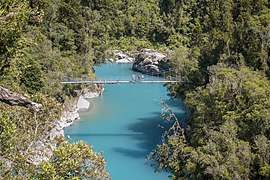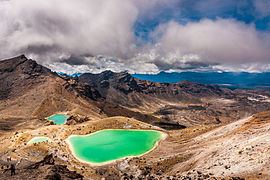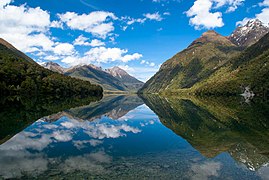New Zealand
New Zealand (Māori: Aotearoa [aɔˈtɛaɾɔa]) is an island country in the southwestern Pacific Ocean. It consists of two main landmasses—the North Island (Te Ika-a-Māui) and the South Island (Te Waipounamu)—and over 700 smaller islands. It is the sixth-largest island country by area and lies east of Australia across the Tasman Sea and south of the islands of New Caledonia, Fiji, and Tonga. The country's varied topography and sharp mountain peaks, including the Southern Alps, owe much to tectonic uplift and volcanic eruptions. New Zealand's capital city is Wellington, and its most populous city is Auckland.
"NZ" redirects here. For other uses, see NZ (disambiguation) and New Zealand (disambiguation).
New ZealandAotearoa (Māori)
- 48.2% no religion
- 36.5% Christianity[n 4]
- 8.3% other
- 6.7% unanswered
- New Zealander
- Kiwi (colloquial)
6 February 1840
26 September 1907
25 November 1947
1 January 1987
1.6[n 5]
![]() 4,699,755[9]
4,699,755[9]
19.5/km2 (50.5/sq mi) (167th)
2023 estimate
2023 estimate
![]() 30.0[11]
30.0[11]
medium
New Zealand dollar ($) (NZD)
dd/mm/yyyy[14]
left
The islands of New Zealand were the last large habitable land to be settled by humans. Between about 1280 and 1350, Polynesians began to settle in the islands and then subsequently developed a distinctive Māori culture. In 1642, the Dutch explorer Abel Tasman became the first European to sight and record New Zealand. In 1769 the British explorer Captain James Cook became the first European to set foot on and map New Zealand. In 1840, representatives of the United Kingdom and Māori chiefs signed the Treaty of Waitangi, which in its English version declared British sovereignty over the islands. In 1841, New Zealand became a colony within the British Empire. Subsequently, a series of conflicts between the colonial government and Māori tribes resulted in the alienation and confiscation of large amounts of Māori land. New Zealand became a dominion in 1907; it gained full statutory independence in 1947, retaining the monarch as head of state. Today, the majority of New Zealand's population of 5.25 million is of European descent; the indigenous Māori are the largest minority, followed by Asians and Pasifika. Reflecting this, New Zealand's culture is mainly derived from Māori and early British settlers, with recent broadening of culture arising from increased immigration. The official languages are English, Māori, and New Zealand Sign Language, with the local dialect of English being dominant.
A developed country, it was the first to introduce a minimum wage, and the first to give women the right to vote. It ranks very highly in international measures of quality of life, human rights, and it has low levels of perceived corruption. It retains visible levels of inequality, having structural disparities between its Māori and European populations. New Zealand underwent major economic changes during the 1980s, which transformed it from a protectionist to a liberalised free-trade economy. The service sector dominates the national economy, followed by the industrial sector, and agriculture; international tourism is also a significant source of revenue.
Nationally, legislative authority is vested in an elected, unicameral Parliament, while executive political power is exercised by the Government, led by the prime minister, currently Christopher Luxon. Charles III is the country's king and is represented by the governor-general, Cindy Kiro. In addition, New Zealand is organised into 11 regional councils and 67 territorial authorities for local government purposes. The Realm of New Zealand also includes Tokelau (a dependent territory); the Cook Islands and Niue (self-governing states in free association with New Zealand); and the Ross Dependency, which is New Zealand's territorial claim in Antarctica.
New Zealand is a member of the United Nations, Commonwealth of Nations, ANZUS, UKUSA, OECD, ASEAN Plus Six, Asia-Pacific Economic Cooperation, the Pacific Community and the Pacific Islands Forum. It enjoys particularly close relations with the United States and is one of its major non-NATO allies;[15] the United Kingdom; Samoa, Fiji, and Tonga; and with Australia, with a shared "Trans-Tasman" identity between the two countries stemming from centuries of British colonisation.[16]
Government
Travel
General information
42°S 173°E / 42°S 173°E




